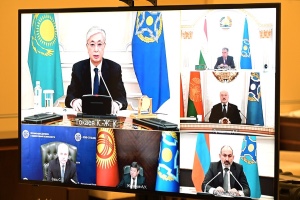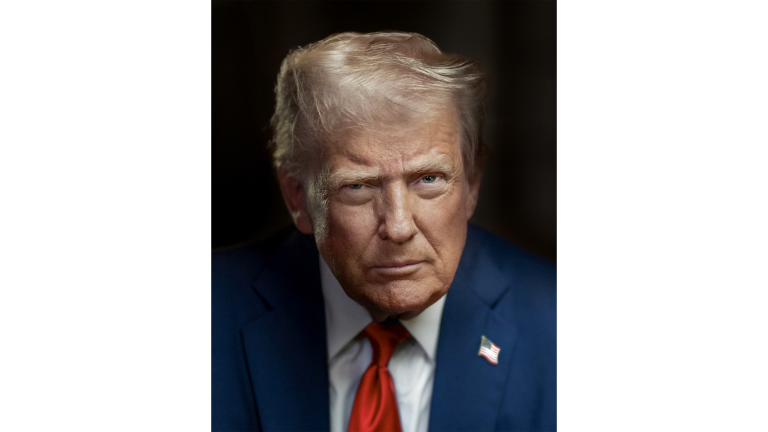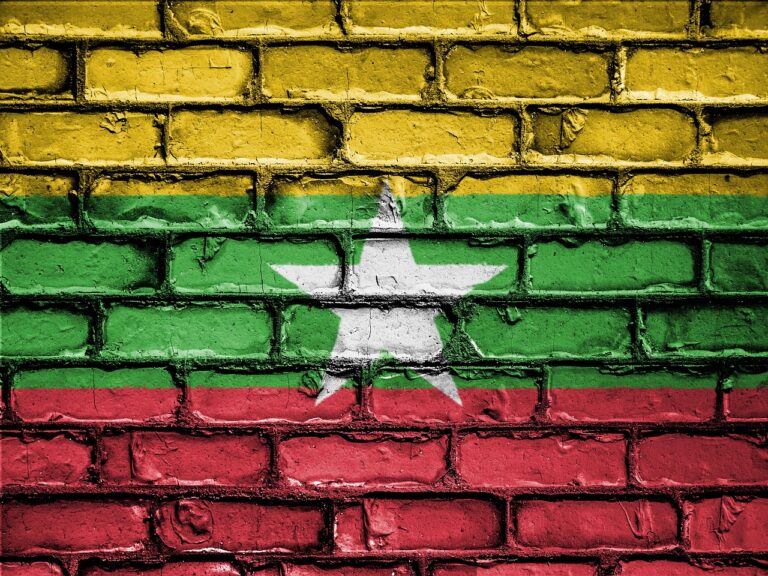
Members at the online emergency session of the CSTO Collected Security Council today
Moscow/Beijing/New Delhi: Kazakhstan President Kassym-Jomart Tokayev today said that “constitutional order” was restored in Kazakhstan and his government “averted dangerous threats to the country’s security”. Kazakhstan, he informed, was having a day of nationwide mourning over those killed during the days of tragedy in Kazakhstan today.
While 16 members of law enforcement and the military had so far died and over 1,300 got wounded, Tokayev said the “exact figures” of civilian casualties were yet to be obtained. He claimed more than 1,270 businesses were affected across the country, with more than 100 shopping centres and banks looted. “The police alone lost about 500 vehicles, either damaged or burnt. The physical damage has been huge, and a special government commission has been tasked with assessing it,” he said.
Speaking at an emergency session of the Collective Security Treaty Organisation (CSTO) Collected Security Council in a video conference meeting, he vowed to identify those who were involved in the crimes, as part of the counterterrorist operation.
To date, in accordance with the Collective Security Council’s decision, the CSTO Collective Peacekeeping Forces of 2,030 troops and 250 pieces of equipment have been deployed in the Republic of Kazakhstan and have begun to fulfil their assigned tasks. They are protecting and ensuring the security of airports, military depots and other strategic facilities. This is the first ever CSTO peacekeeping mission.
“We will crack down on any forms of violent extremism and even more so on any hostilities in Kazakhstan like the ones that have been taking place over the past few days. We will not tolerate any attacks against Kazakhstan’s state sovereignty or territorial integrity,” he said.
Also read: CSTO peacekeeping forces arrive amidst bloody violence in Kazakhstan
As of today, the police had detained some eight thousand people in Kazakhstan and the law enforcement agencies and the special services were about to verify whether they were involved in terrorist acts, killings, looting or other crimes.
“We have confiscated 116 weapons,” Tokayev said and informed the CSTO members that this was an ongoing operation, “and since the fighters on the run are using new tactics to conceal themselves by wearing civilian clothes, shaving their beards, etc.,we are also making the necessary adjustments to the way we operate”.
Russian President Vladimir Putin, Armenian Prime Minister Nikol Pashinyan, President of Belarus Alexander Lukashenko, Prime Minister of Kyrgyzstan Akylbek Japarov, President of Tajikistan Emomali Rahmon and Secretary General of the Collective Security Treaty Organisation Stanislav Zas, attended today’s emergency meeting at the request of Tokayev.
Tokayev said tomorrow he will submit his proposals on the new cabinet to parliament and will set forth specific objectives for overcoming urgent socioeconomic challenges. The large-scale counterterrorist operation will end soon, and with it, the successful and effective mission by the CSTO forces will also end.
“Most importantly, we need to prevent events of this kind from repeating across our collective security space. I think that this is our core mission for the near future. Kazakhstan is ready to move in this direction and will always stand by its allies,” he said.
Lashing out at Western media, he said the legitimacy of deploying the CSTO forces in Kazakhstan is being questioned. “This is happening due to a lack of reliable information and a misunderstanding of the entire situation. In some cases, the international community, including foreign media, seems to entertain entirely incorrect interpretations of both the use of CSTO forces and the overall situation in Kazakhstan. Despite the available evidence, some sources are claiming that the Kazakhstani authorities are cracking down on a peaceful protest. This is absolute misinformation. We have never used and will not use armed force against peaceful demonstrators”.
Tokayev claimed all the events that had taken place since the beginning of this year “are links in the same chain. They are part of a single destructive scenario that has been in preparation for a long time. Investigation will reveal whether these preparations were made over one, two or three years”.
Elaborating on the current developments in the country, he claimed destructive forces made numerous attempts to undermine stability and start a rampage.
“The state was tested for stability and resistance. All these efforts were cut short resolutely, but the organisers did not abandon their plans and started preparing for armed action. They used public discontent over vehicle fuel prices as a pretext in several regions. Rallies were held, during which protesters advanced socio-economic and socio-political demands. The state took these demands into account and acted on them. The government withdrew, prices of LPG fuel have been reduced and frozen. We announced the adoption of a package of practical socio-economic measures and a clear-cut plan of socio-political reforms,” he said.
However, he claimed it no longer mattered for the organisers of this aggression against Kazakhstan. “Spontaneous rallies were used as a pretext for provoking civil unrest. Religious radicals, criminals, outright thugs, looters and petty hooligans filled the streets as if on cue. Socio-economic and socio-political demands were put on the back burner, they were forgotten. Next followed the hot phase, and armed fighters, who were biding their time, took over.”
He claimed that the main goal of these events were to undermine the constitutional system, destroy governance institutions and seize power.
“It is obvious now that these armed activities were coordinated from a single centre, and the carefully planned operation entered its decisive phase. Proof of this is provided by the simultaneous – I repeat, simultaneous – attacks on the buildings of regional governments, law enforcement agencies, pretrial detention centres, strategic facilities, banks, the TV tower and television channels. They seized airports, blocked motorways and railway lines and hindered the operation of ambulances and fire-fighters.
“During attacks on military units and checkpoints, the thugs attempted to seize weapons and military equipment. Real fighting went on in Almaty and several other cities. For example, the attack on the Interior Ministry department in Almaty went on for two nights. The police repelled the attacks. Seven armourers’ shops were seized in Almaty alone. These attacks were staged by trained professionals, including snipers armed with special rifles.
“The terrorists used special communication equipment and wore military and police uniforms. They cynically used the protesters as human shields. Using their five-fold superiority in terms of numbers, the thugs attacked our police and military personnel, beating them up with extreme brutality, decapitating two of them. There were barbarous attacks on hospitals.
“Seeking to stretch the state’s resources, the masterminds organised their attack across a wide front. Their aggression was taking place across 11 regions simultaneously, but their main blow was directed at Almaty. As you know, this is the largest city in Kazakhstan, the country’s financial centre, which also serves as the main transport and communications hub. Losing control of this city would have paved the way to losing the densely populated southern part of the country and then the country in its entirety. Terrorists hoped to stretch thin the law enforcement agencies and then attack the capital of Kazakhstan. We have seen fighters converge on the President’s residence. In fact, this was a real war unleashed by terrorists against our state using various methods.
“We had to take unprecedented measures in response. Kazakhstan’s military and law enforcement agencies have succeeded in mobilising themselves, rebuffing the attackers, and taking control of the situation. Unfortunately, this came at a very high cost…I can tell you in all certainty that terrorists, including foreign fighters, were directly involved in the aggression against Kazakhstan. It was not a coincidence that the criminals attacked morgues at night to collect and drive away with the corpses of their dead accomplices. They also took the corpses of fighters from the battlefield. We know what kind of international terrorists do this: this is how they cover up their tracks. It is obvious that they want to sow chaos in our country to seize power,” Tokayev stated.
Terming the recent developments in the country as a terrorist threat and an act of aggression, he said these developments reached a critical point when criminals took control of Almaty and nine regional capitals. “This is when we declared a counter-terrorist operation,” he revealed.
Kazakhstan turned to the CSTO for assistance, which he said proved to be extremely timely. “When the fighters learned that three cargo planes had arrived in the country’s capital, they gave up on their plan to seize the President’s residence. This enabled us to send more forces to Almaty and recapture the city from the hands of the terrorists,” he said.
Russia says CSTO will not allow anyone to stir up trouble at home
Russian President Putin noted the situation was being gradually normalised as a result of the measures implemented by the leaders of Kazakhstan with CSTO’s support. “Kazakhstan’s service personnel and law enforcement agencies have completely expelled terrorists and bandits from a number of vital installations, including the Almaty International Airport. I am confident that our joint efforts will make it possible to fully reestablish control over the situation nationwide and to stabilise it, and that peace and tranquility will, at last, be reinstated in Kazakhstan,” he said. He though warned that the events in Kazakhstan “are not the first and certainly not the last attempt to interfere in the domestic affairs of our states from outside… The measures taken by the CSTO clearly show that we will not allow anyone to stir up trouble at home and will not permit the realisation of another so-called colour revolution scenario.”
Putin endorsed Tokayev’s claim that the current threat to Kazakhstan’s statehood was not rooted in the spontaneous protests over fuel prices but in the fact that destructive internal and external forces made use of this situation. “The people who protested over the situation on the fuel market and their goals are different from the people who took up arms to attack the state and their goals,” he said. He further mentioned that ‘Maidan’ technologies of armed and information support were actively used for the protests. “There were organised and controlled groups of fighters, as President Tokayev has pointed out just now, including people who had apparently received training in terrorist camps abroad, and their attack on Kazakhstan, as President Tokayev has noted – and it was essentially an attack on the country, on Kazakhstan – amounts to an act of aggression. I fully agree with him in this regard,” he said.
China offers to work with Kazakhstan to uphold political power security
China meanwhile expressed its “firm support “for the Kazakh side’s efforts to maintain stability and end violence at a critical moment bearing on the country’s future. The Chinese foreign ministry spokesperson Wang Wenbin disclosed in Beijing that State Councilor and Foreign Minister Wang Yi had had a telephone conversation today with Kazakhstan’s Deputy Prime Minister and Foreign Minister Mukhtar Tileuberdi in this regard.
Wang stressed that the “unexpected chaos” in Kazakhstan showed that the situation in Central Asia still faces severe challenges and some external forces don’t want to see peace and tranquility in the region. As a neighboring country, he said that China hoped Central Asia could maintain long-term stability and achieve development and revitalization more than anyone. “China is ready to work with Kazakhstan to enhance cooperation between law enforcement and security departments, strengthen bilateral cooperation against external interference, uphold the two countries’ political system and political power security, forestall and foil any attempt at instigating “color revolution”, and jointly oppose the interference and infiltration of any external force,” Wang told Tileubardi, who replied that Kazakhstan fully agreed with China’s proposals and was ready to have close communication with Beijing to strengthen security cooperation and jointly combat terrorism, separatism and extremism.
It may be recalled that three days ago, President Xi Jinping had sent a verbal message to President Kassym-Jomart Tokayev to openly voice China’s support.
India closely following the developments
In New Delhi, Arindam Bagchi, the spokesperson in the ministry of external affairs (MEA), said Indian nationals in Kazakhstan were safe, and stated that as a “close and friends partner of Kazakhstan, we look forward to an early stabilisation of the situation”. Bagchi added that India was “closely following” recent developments in Kazakhstan.
– global bihari bureau






Good job on the new site!
Congrats on your new site